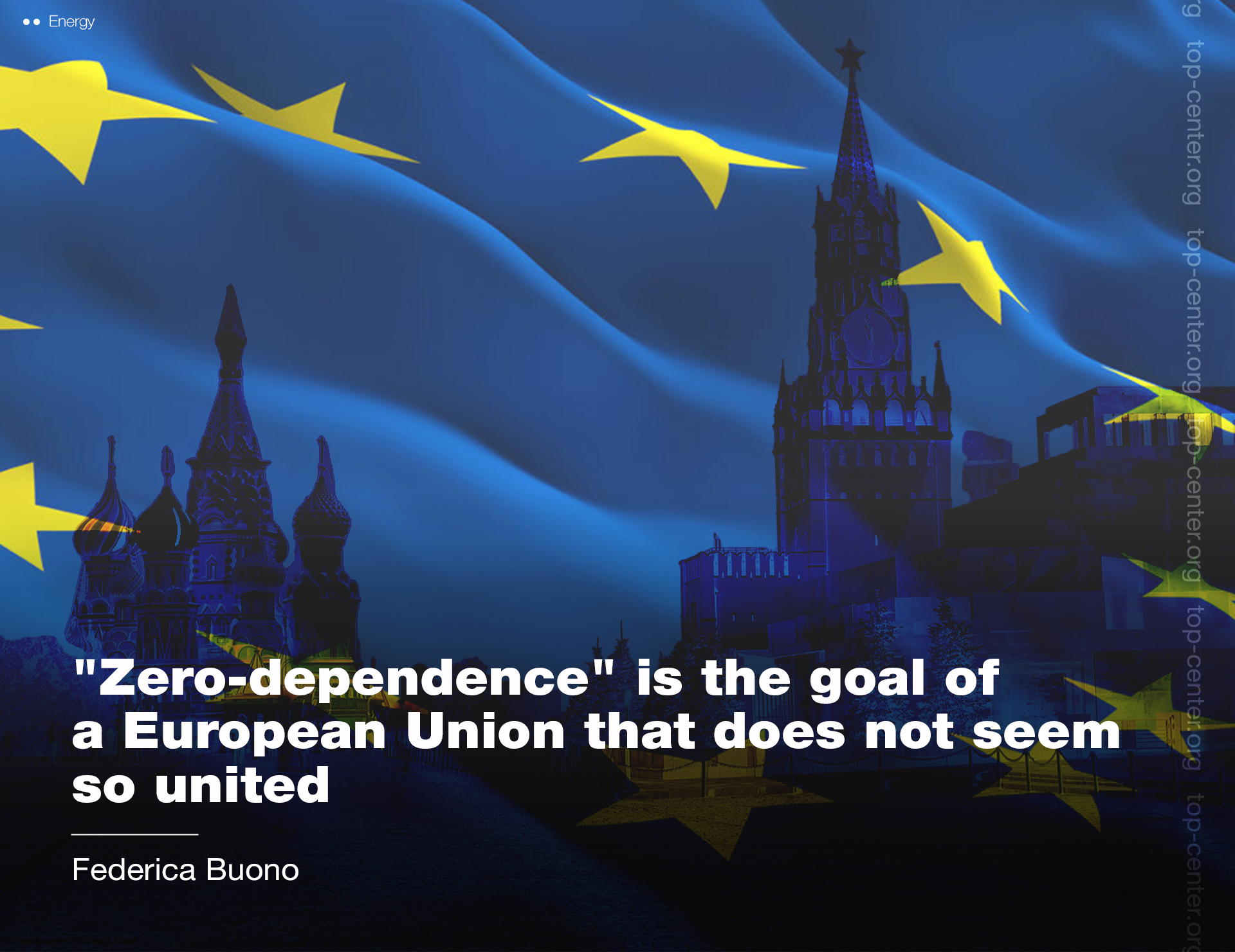"Zero-dependence" is the goal of a European Union that does not seem so united

It has been almost three months since the beginning of Russia’s invasion of Ukraine and all the economies of the European countries have been negatively affected. On that account, all the single EU protagonists are, besides managing the Ukrainian war, directing and focusing their domestic policies to find solutions for fiscal difficulties. So, at a time when war crimes are taking place and the European voice should speak harmoniously, it appears, on the contrary, trembling and hesitating, and the future outlook is anything but promising. Which repercussions might this rambling behavior lead to?
In reality, there is a premise that needs to be made. Back in 2014, when Russia illegally annexed Crimea, the EU had already expressed its intention to punish Russia’s hostile behavior. Now, as then, the European Commission has stressed the need for a prompt and homogeneous response to the Russian Federation in terms of sanctions. Indeed, on several occasions the European Union has publicly condemned Putin administration’s actions in its attempt to control the Donetsk and Luhansk Republics, defining them as `unjustified military aggressions`, thus adopting economic, financial, and diplomatic sanctions at both individual and state level. Starting on February 23, a real relay race of restrictions has begun and the latest penalties package signed on April 8th, the fifth in the present case, has established the decision of Brussels of an embargo on the import of the Russian coal. In addition to that, there has been a stop also to the import of goods such as cement, wood, liquor, armaments and high technologies products.
Moreover, the EU decided the extension the inclusion in the European black list of several Russian personalities, confirming later also the ban on access to EU roads for Moscow's truck drivers. The sixth package of sanctions is already on its way and it is still seen as the central node of the oil and the achievement of relative independence from the black gold. On top of that, with the outbreak of the war, in the name of Ukrainian solidarity the EU has mobilized different tools in its hands to offer temporary protections for refugees and humanitarian support by sending essential goods. Also, it proposed the project idea of the possibility for Ukraine to join the European Union complex and solid financing for the military contribution. In the light of that, the EU carried out a revolutionary maneuver because it was actually the first time ever that it provided a country with war material.
However, these actions are generating a certain degree of disagreement within the European countries themselves. Despite the fact that the last Council`s vote related to Russian sanctions showed a rather homogeneous intent, with only 22 against and 19 abstaining, the voice of the Union certainly does not sing in unison. Looking at the wider picture, during the last few months, almost all countries of the European Union have been facing very serious inflation, and no one has been able to escape the grip of the crisis. In March, the entire Eurozone recorded an inflation rate of 7.5 percent, a number that, according to the Eurostat survey, is around 6 times higher than in 2021. Surprisingly, the situation started to be extremely complicated already last summer, therefore before the ongoing war, when an inconsistency between the levels of supply and demand has caused gas prices to spike, making the winter harsh not only from a climatic standpoint. However, there is no doubt that the EU has faced an economic shock following the invasion of Ukraine.
The unstoppable increase in energy prices is weighing on the cost of living, and according to the forecasts the situation is doomed to worsen. Energy is not the only thorn in the side that is beginning to leave Europe breathless. Indeed, together with the increase in energy bills, the serious food crisis makes the world tremble, and today those goods that until a few months ago people used to buy with a few euros have come to `cost like gold.` Ukraine and Russia are considered the breadbaskets of the world, being producers of raw materials such as wheat, corn and sunflower seeds. This has aroused feelings of frustration among the European population and leaders. Above all, the European Heads of State have found themselves both blinded by high inflation, which in some cases has touched and exceeded double-digit figures, in the case of the Netherlands, Latvia, Estonia and Lithuania, and the struggle to recover from the pandemic. This has originated a sense of bewilderment and concern that has led them all to follow different and often independent policy lines.
So, if the main common objective was a zero dependence policy from the Kremlin, as explained by the President of the European Parliament Roberta Metsola, in reality not all member state governments have agreed to follow this line. Indeed, even if the intent of most European countries is to totally untie themselves from Russian oil dependence, as Baltic nations have already been doing since the beginning of April, others would consider this choice to be too drastic and dangerous, first amongst all Austria. The latter, although being aware of the need to cut the Muscovite umbilical cord as soon as possible, believes that this decision would affect it more negatively than the sanctions imposed on Russia itself. Also, with regard to the drafting of the list of personae non grate entering Europe for having had relations with the Russian government, Hungary and Austria made a stand having a lot of objections on the matter.
Halfway between those who have already untied themselves from Moscow and those who are trying to resist this trend, there are all those countries that are running to the shelter in order to diversify their energy portfolio as soon as possible. Action in the forefront is certainly carried out by Italy that in the last period has begun a real `oil tour`. “European countries are financing the war by buying Russian oil, we need to find a price gap”, said Mario Draghi, Italian Prime Minister, who has been guiding his country towards stipulating agreements to increase oil and gas supplies with countries such as Algeria, Libya, Qatar, and Azerbaijan. It is precisely in Azerbaijan that Italian Foreign Minister Luigi di Maio has recently been to discuss and implement the already solid Rome-Baku energy cooperation. Currently, in Italy the economic situation is critical, and the price growth has been constant for the 9th consecutive month, a scenario that has not occurred since 1991. Similarly, Spain, one of the countries hardest hit by the energy crisis, has seen many of its companies forced to stop production due to the unsustainable costs of gas and electricity. Moreover, in this unmanageable maelstrom of chaos, Madrid is arguing together with The Hague to demand the EU adopt the consolidation of public accounts "to the specific situation of individual countries" and ask to introduce simpler rules on public spending. Still in the European frame, Sweden and Finland are grappling with a delicate decision to join NATO. For weeks now these two countries have been in the center of international attention for their application to the Organization, which became official a few days ago even though Russia was urging them against becoming members.
Therefore, the harmony of Europe has been and will be in the near future under pressure because of the intensification of the economic effects of the war. The real concern today is the specter of stagflation. Wandering between dissimilar affairs and dynamics is bringing Europe in the eye of a storm force, since there will not be enough wealth in the economy to keep up with the cost of living. All the countries of the EU are facing internal political, economic and social issues of a certain magnitude, so their ability to act and respond in a united and homogeneous way to today's challenges, and in particular to the management of the situation in Ukraine, is inevitably limited. The inflationary fever, the increasing shortage of supplies, the growing unemployment on the one hand and economic slowdown on the other are giving credence to hypotheses that have always seemed distant in the expert's minds, such as those of fiscal stagflation. This would be an inevitably tragic scenario that would be added to an equally dreadful current one in which prices would continue to rise and economic growth would on the contrary slow down. This is clearly an assumption, just as it was predicted for high inflation which, as we have seen, is no longer a temporary dilemma at all. So, there is a forecast of an economy that can be close to catastrophe while the unity that distinguishes the European Union takes a back seat.







